GARY HALL: A RECONSTRUCTION
GARY HALL: A RECONSTRUCTION
by Norman Warwick
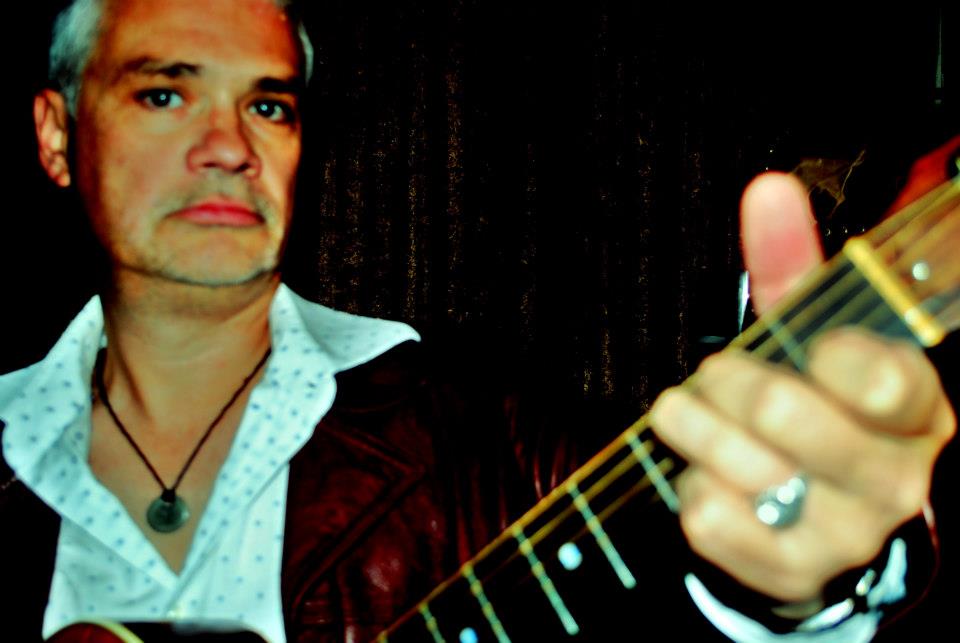
Gary Hall grew up in a hotel / guest house / hostel run by his mother, and their guests provided much inspiration for the songs he would later write.
‘Some of the boarders were mental patients, some had just come out of prison and so I met a lot of interesting people, and possibly some of the despair I felt for those people, the sheer anger, and pity, affected my songs and added the ‘sweet and sour’ they might have lacked had my parents been dentists bringing me up in the middle of suburbia.’
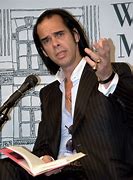
His earliest remembered listening is Slade, and he first began writing his own material during the last days of Punk. He recalls that in his teenage years he was ‘searching for depth’ in music by the likes of Echo And The Bunnymen, Concept Angels and The Sound. Moving into his twenties he was listening to The Waterboys, The Triffids and Nick Cave (right) And the Bad Seeds,…. ‘getting a bit more towards the real stuff’,… and then REM and the whole American thing round the end of the eighties and discovering, en route, the Australian scene and bands like Green On Red.
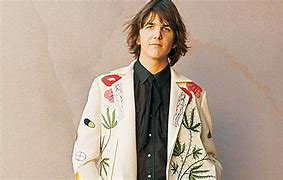
‘And then, through a friend who was a lot older and who had a great record collection, I heard Tom Waits, Gene Clarke, Gram Parsons, Bob Dylan and Van Morrison and just this last year I’ve really got into the singer-writer genre in so much as I listen to Townes Van Zandt and Guy Clark etc.’
From infancy, Gary Hall was employing teddy bears as backing musicians and a cricket bat and cardboard box as guitar and drums.
‘I always wanted to be a rock and roll star, with drugs and fancy limousines and all that. Only when I got them did I realise I was desperately unhappy and just recently I’ve decided to take two steps back in order to take a million steps forward, for the sake of my health and state of mind.’
At sixteen, Gary Hall was playing at youth clubs in his Preston environment, with an amp and a p.a. and a band called Project One, and by nineteen was making demos with the first group of his own, Blue Seige. His mother let him convert half the garage into a rehearsal room and, realising his only skills were with a guitar, steered him towards a career in music.
‘It was a staggering thought, at that age, to realise I might make a living at something I enjoyed more than sex,…or even eating!’
The actual writing of his songs has never come easily to Gary, although on disbanding Blue Seige he began to realise his material had something special and that, drawing on his background, he could at least make the process a little less difficult.
‘I remember one song, which I called Shapes On The Paper, that I wrote after seeing my mum crying, weary of looking after hardened criminals who were robbing our gas meters and such. At twenty one, there wasn’t much I could do,… these guys really were hardened criminals. That song came very quickly,… eight verses, no chorus, and I still think it’s a great lyric,… but usually my work takes a bit longer than that.’
Gary, though, is a pretty dogmatic character, and acknowledges he might prove an awkward partner in any writing collaboration.
‘I can’t play industry games,… wearing what I’m told, or saying what I’m told and I’m pretty sure I couldn’t handle somebody suggesting alternative lines to my lyrics.’
He has, however, constantly written songs when needed and om collaboration with his band. With The Stormkeepers he recorded three albums of his material. Each successive album was increasingly acclaimed by the critics but the big TV or radio break they required proved tantalisingly elusive.
‘Twelve months ago I felt pretty bitter about it all and at twenty seven, as I was then, I felt like chucking in all this rock and roll nonsense. Then I remembered that Guy Clark, for instance, didn’t even cut his first record until he was in his thirties, so I try to be philosophical about it all. I still hear some of the crap that is commercially successful, and I wonder what the hell is going on. Then I hear somebody brilliant who doesn’t sell as many records as I do and I realise none of it makes sense.’
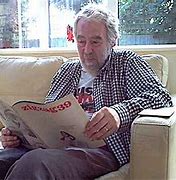
‘Sometimes I go to sleep thinking God bless John Tobler, because there have been times when journalistic support like his and from people like you, Norm, and Graeme Livingstone at the specialist magazines, has really kept me alive,…. and music is far more important than life! A review by a credible journalist can help fill a venue and keep a band on the road, or might prove to be the spark that sends somebody into a record shop in search of the album.’
‘Oddly enough, though, some of those favourable reviews labelled our sound as ‘country’. Now, I love country music, not only the new stuff like Nanci Griffith either but also straight stone-country. I also love REO Speedwagon or anyone with good songs. I would say that, as a genre, country has more than its share of good songs.’
‘However, the critics might say I’m country but audiences probably don’t. Some country fans at my gigs have to be treated by St. John’s Ambulance people because I’m so far from what they were expecting. People seem to see me for the first time and instantly assume I eat babies or something. I don’t mean to appear that way, or as any kind of outlaw, or British equivalent to Willie (Nelson) or Waylon (Jennings). But I can only be myself, and I won’t go on stage in a country outfit and sing Big Bad John. People on the country circuit are always suggesting that if I would just do this, that or the other then I could really make it big on the country scene. But if that is what it takes, then forget it ! I feel that if I write a good song, with a good lyric, in the country genre, then people should accept it for what it is, but not expect me to play games to package it.’
After years of writing material suitable for adaptation and enhancement by The Stormkeepers, Gary is these days penning songs designed to be performed solo on guitar, and we can hear in those songs subtle influences from country regions as diverse as Steve Earle and Townes van Zandt.
In my opinion, though, Gary Hall has already written several songs that deserve to be hailed one day as rock classics, such as Keep On Burning Bright, Where Every Diamond Shines and Shipwrecked or Passing Through. These all perfectly illustrate the lyricism, arrangements and integrity which The Stormkeepers invested in Garage Heart and Wide Open To The World, their two albums still available on the Run River label.
Gary and the band have played to audiences of thousands on the Continent, but the absurd myopia and narrow mindedness of the British music press (and so, too, the fans) allowed these albums to become trapped in the sieve of categorisation.
Where The Stormkeepers, brilliant musicians to a man, go from here is difficult to forecast.
It seems inevitable that Gary Hall will have to lean further into the role of solo singer/writer and hope that his material eventually receives the deserved recognition so far denied to him and his excellent band.
In truth, perhaps, he has yet to receive the consistency of writers like Townes, Tom Russell or Guy Clark, but with one his latest and as yet unrecorded compositions, She’s Out There Somewhere, I feel Hall has at least proved he can match their heights of perfection. It’s a soul number, over a gentle country picking and is performed with a rock and roll heart. Those cover versions all those years ago, of country rock classics like Wild Horses and Helpless, were the pointers to where the artist stands today,… at a crossroads from where he has to choose a direction.
Gary Hall doesn’t eat babies and behind the unkempt façade and provocative faux arrogance is a caring, concerned and perhaps even insecure young man, only occasionally revealed in his music.
He lives to be loved, but like all rock musicians he was born to be wild. Listen to his songs and look at him on stage,…‘Partly truth and partly fiction, he’s a walking contradiction’,…and wonder just who the hell those lines were really written about.
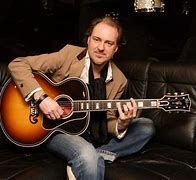
Ian and Gary and Mike Weston King , another excellent songwriter in The Stormkeepers, came round for a meal on the occasion of my fortieth birthday for one of Dee’s slap up suppers. It was light-hearted and full of laughter but there were tensions just below the surface. Ian and I knew some of the concerns Gary now had about the direction of his career, and knew he hadn’t yet shared those concerns with Mike.
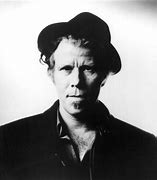
Over the next few months Ian and Gary and I would regularly meet up around the Preston area, as Gary didn’t then drive. We would often wander down to the city’s recently newly gentrified dockland areas and have a Tex Mex dish and a pint in one of the many family friendly pubs that had sprung up on the waterfront. We’d head back to Gary’s (mum’s) place in pretend insobriety singing out Tom Waits lyrics into the cold, dark night. ‘I’m wasted and wounded, but it ain’t what the moon did.’
Suddenly, after a couple of weeks of frantic dramas, Gary was in Nashville for recordings for his debut album, as a solo artist, on the Roundtower label. During that visit Gary performed at an already famous venue, The Bluebird Café, that is now also the setting for A Thing Called Love, a new movie by Peter Bogdanovich.
The film dramatises a story, well worth the telling, of Amy Kurland, who opened The Bluebird café as a casual gourmet restaurant in 1982, with the further intention of utilising it as an occasional venue for live music.
The implementation of Sunday ‘writer’s nights’ three years later proved an immediate success and continues today to afford new writers the opportunity to audition and perform before a special guest writer.
Singer writers, whether local or from far afield or even from foreign shores can be sure that if they pass the audition then they will play to a knowledgeable audience in the listening room where the club’s famous ‘shhhh’ policy is strictly enforced.
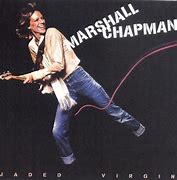
Mary Chapin Carpenter, Rodney Crowell, Marshall Chapman, Guy Clark, Steve Earle, Joe Ely, Steve Forbert, Trisha Yearwood and Maria Muldaur are artists who might well have their names carved into the table tops at The Bluebird Café,….and so, now, might Gary Hall.
The Preston based Roundtower artist, who was in Nashville recording his debut album for the label, had gladly accepted the invitation to perform at a venue that has played host to so many of his heroes. Imagine his nerves, stepping on to the stage in a club where even its menial employees sometimes become stars, —
bartender Mark Irwin wrote Here In The Real World for Alan Jackson, waitress Liz Hengber has penned a hit for Reba McEntire, the open-mic host Barbara Cloyd slipped a hit to Lorrie Morgan and even the cook, Kim Richey, wrote a big song for Radney Foster called, inappropriately ot seems, Nobody Wins.
Hosting the show was Cathryn Craig, a well established session singer in Nashville, who was delivering backing vocals in the studio for Gary as he laid down his tracks. She herself performed the three opening numbers of the evening. The rocky Jealous Heart, the happy song, a rarity for her she joked, In Nashville Tennessee, and the beautiful I Knew The Truth.
She then gave Gary Hall a generous but genuine and professional introduction, informing the 200 capacity club audience (only 21 tables can be reserved, though, after that its prop up the bar time) of Gary’s ability as a songwriter and his deserved new deal with Roundtower. Such commendations were immediately rendered superfluous, though, as Gary Hall burst into Where The River Meets The Sea, a rites of passage number, slated for the new album.
With adrenalin flowing, and in such a hallowed arena, it must have been tempting to thrash the guitar and bellow out the lyrics, but with remarkable composure and with great dignity Hall slowed down to perform perhaps his best composition to date. She’s Always Been A Hotel, with a lyric even Butch Hancock would be proud of.
Then came Let the Music Take You, a new song, written even during the mixing of the current album, but that will surely be on the second one. It is a celebration of how music helps us make it through and you can’t help punching the air every time he reaches the chorus.
Admitting his nervousness, he nevertheless remained true to his spirit with a handful of the vague but witty asides that somehow always seem to make perfect sense. There is, behind his brilliant disguise, a real troubadour in the rock n roller, and he is never afraid to wear his heart on his sleeve. She’s Out There Somewhere was beautifully delivered and I go into print my assertion that this song compares with the best by any of the great writers Gary and I so admire. Clark, Van Zandt and others, its true, have a bucketful of songs this good but Hall is still only twenty seven and has, with this song, shown what he is capable of. He ‘dedicated’ the song to me and another mutual pal back in England,… he then mumbled to himself, then, that he doubted we could hear it!
Her Devils Kept Dancing, about a lady with a split personality, is a song with an insistent guitar run that will, I am certain, be a highlight of his album when it is released. He introduced the next number Oceans Apart, somewhat dismissively, as being about a holiday romance, … but those of us who know, know !
Unsure of the audience and on stage, for the first time in years, without the security of The Stormkeepers, whilst in a strange land and on a bill topped by a much covered and famous writer, Gary maintained a continuous between-song dialogue with his audience. It sometimes requires great courage to talk openly about the meaning of a song, especially when that song is a hardly commercial one about a sight-saving medical operation. My Father’s Eyes, however, is an uplifting tale rescued from mawkish sentimentality by a passionate delivery. It was well received by the country fans rapidly filling the room to catch more of Gary’s set.
He closed the set triumphantly with the raunchy Stay All Night, which sounds overtly sexual but is in fact more to do with a sense of loneliness.
And suddenly, it was over.
Gary Hall had taken his songs out among his peers and had not only survived but also triumphed. He is proof that a British musician can write, play and sing country music to an American audience, so long as he remembers that country music is, in fact, neither American nor British, but is universal. Heartache is a heartache in any language.
Tennessee is surely Gary’s spiritual home where he is among like-minded folk who don’t give a Flying Fish about the length of his hair, the holes in his jeans or even the rapid-fire bursts of opinion he shoots out indiscriminately whenever he feels threatened.
As Gary settled back to watch, and learn from, Hugh Moffatt’s top of the bill set, it must have seemed to him that Worthing Festival (past) and The Bluebird Café (present) were, to coin a phrase, Oceans Apart, and he could have been forgiven a smile of satisfaction. Later, though, he could talk only of the brilliance of Hugh’s Rose of My Heart.
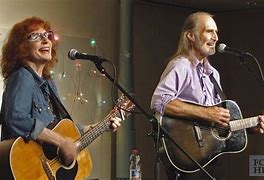
Those who have ever seen Hugh Moffatt perform in concert in the UK might have been amazed at just how much confidence he exuded here on stage. Obviously much less intense in this, his natural habitat, he performed a light and lovely set. He opened with a song which will be familiar to his British fans. I Know What Love Is, and then told a funny monologue to introduce a new song, to me anyway, called You And The Money Too. He told us that this had been written after a long consideration of the phrase ‘not for love nor money,’ after which he arrived at the conclusion that love and money need not be mutually exclusive!
This he followed with perhaps his three most successful compositions of Carolina Star, Words At Twenty Paces and the often covered Old Flames Can’t Hold A Candle To You.
It was revealing, though that Hugh then invited hostess Cathryn Craig back on to the stage. In doing so he introduced us to a newly written song called If I Gave My Heart, and said he was still learning from Cathryn how best to sing it! Her live performance of it on this night was simply stunning and such a commercial song could surely provide success for both its writer and his guest singer. Hugh then concluded his set with Angel Wings and the song that so impresses Gary, Rose of My Heart.
There was still further entertainment to come as Cathryn introduced Tom Stanko, a name new to me, who sang with his wife on the bouncy Sleeping With The Lights On and a further four songs. Like Gary earlier, Tom found the audience receptive to his material as he drew the events to a close.
With photographs of stars who have previously played at the venue adorning its walls, and several of Sidetracks’ heroes sitting in the audience, the place simply breathed history. With original music being performed there seven nights a week, and with ‘conversation being actively discouraged’ it provides a perfect ambience in which writers can introduce their material.
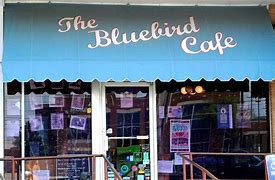
I doubt if, when she moved to Nashville at eight years old, Bluebird proprietor Amy Kurland ever in her wildest dreams had a vision of what she now owns. Down the years, though, she gained a double major in American Literature And Studies, and then used the experience she had gained working as a student in restaurants in Washington and Nashville to open The Bluebird Café. Today, she and her dog Daisy live almost next door to the premises.
Any interest, bound to be generated by the forthcoming film, will surely focus on this tight knit, creative community will be a positive light.
And so Gary Hall returned from Nashville on completion of the recording of his first solo album, his first to be recorded in the States and his first on the RoundTower label. He has previously recorded with his then band The Stormkeepers and their albums drew massive praise from the country / roots journalists in the music press. Somehow, though, being ignored by the most important radio play lists and the sheer frustration of constantly standing on the very cusp of the big time seemed to break the individual and collective hearts of this band of classy and committed musicians, and they were forced to disband.
Those of us close to Gary knew better than most how painful that decision was and, although Claire Hudson of RoundTower recognising the quality of his writing and persuading her fellow directors to sign him may have salved his wounded professional pride, the hurt of the break up might linger yet for a while. However, he owed it to his songs to seek whatever was the best outlet for them, and the rest of the band are surely talented enough to re-emerge and, as men, are all big enough to realised that their friendship is so strong that it will surely survive what was simply a pragmatic career move that was in the best interests of all concerned.
So, off he went to Nashville, full of the bravado and sheer, naked terror that makes him such fun to know.
Unsure of the drum sound that is an integral part of recording in this city, worried about the ‘bottom end’, concerned that he might not be able to adequately describe to the session guys the precise sound he required Gary was even scared that he might not be accepted by the Nashville movers and shakers. Notice though that there were no thoughts of concession or compromise, for Gary is a determined man and carries complete and utter faith in his material.
Wanting to have someone in his corner, though, he insisted on taking along his guitarist mate Phil Abrams, from the Mirrors Over Kiev line up. Gary knew that Phil’s knowledge of studio engineering and technique would prove invaluable and that his guitar playing would blow away any cobwebs any seen-it-all-before session musicians.
For the three weeks of his time in the studio his mates in the UK have been almost too scared to breathe, waiting to hear that Gary’s demanding perfectionism or his unerring ability to say precisely the right thing to the wrong person at the wrong-est of moments had brought the whole recording to a halt. I, and one or two others, were on the phone, almost daily, to Claire at RoundTower and grew ever more suspicious of her reports that things were going just fine, that the Americans were astonished at the quality of Gary’s songs and were enjoying making a country album from a new perspective. Gary was making friends, she said, with fans, songwriters, session men and girl backing singers.
That could mean only one thing, I worried, … he’s backed down and he’s going to come home with a wishy washy echo of how powerful his music really can be.
We met up within hours of his touching down back in England and it was immediately apparent that he was delighted with the finished product which, naturally, was in the car’s tape deck before we had finished shaking hands. Ian Johnston and I listened in amazement to You’re My Lover Now, the inclusion of which we had both argued so hard for. It is an incredibly commercial number with its catchy chorus ideal for radio play.
She’s out There Somewhere, a song Gary had performed so emotionally at one of John Nelmes’ singer writer nights only a few weeks earlier, was given added poignancy by ghostly backing vocals and Another Back Seat Driver is stuffed full of barbed lines that should be pondered upon by anyone who ever misguidedly would have had him dilute his music to achieve success. I can tell you he has ignored all such advice and has instead delivered twelve excellent, powerful tracks, punctuated by bursts of brass, beautiful guitar runs and dobro as you have never heard it played before.
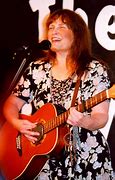
But it is the female backing vocals that highlight the album, (as yet untitled by the way), with Kim Morrison, arguably the most respected female session singer in Nashville, and Cathryn Craig, performing miracle to sound at times as vibrant as a tabernacle choir and at times as soft as the brush of angel wings.
Catherine has an uncanny knack of singing almost counterpoint rather than straight harmony and Gary tells me she has an ability to create new melody lines to enhance a song from first hearing. He even played us a demo tape of her singing her own material, proving she writes good stuff too ! Her voice and Gary’s lyrics seem to me a match made in Heaven.
As we listened to the tape in full, Gary sat nervously behind us for forty five minutes, awaiting our verdict. Well, I’ll tell you what I told him. Too often I have been disappointed by British musicians who have taken rock and roll songs over to Nashville simply to allow that city’s musicians to turn those songs into formatted country music. Gary Hall, tossing his waist length hair from shoulder to shoulder, shirt open to the waist, simply grabbed those musicians by the short and curlies and showed them how he rocks. The result is a stunning album that stands as testament to Gary’s courage in leaving the band and refusing to sell out. It is, quite simply, a rock and roll album by a British writer with an American heart, played by Nashville Cats prowling dirty British back-streets and proving that music really is an international language.
We’re all grown men after all, (well, Ian and I are, Gary’s only twenty seven) and it would have been unseemly to have appeared anything other than nonchalant, so after we had congratulated him and he had thanked us for our support, we decided to go for a meal to disguise our child like excitement at his massive achievement.
Sitting in Owd Nell’s Arms, picking HenryV111 style, on chicken wings, cheese sticks and assorted dips, we listened to Gary telling us about Nashville, Tennessee,… about Tootsie’s Bar and how he stayed there, about the friendship of producer Jay Vern, about standing at the gates of Graceland and, most of all, about the back-porch picking.
He had photographs, of course,….
‘Here’s one of me with Hugh Moffatt.’
‘This is me with Cathryn.’
‘That’s Richard Dobson and his lady.’
‘This is me with Cathryn.’
‘That’s Phil and me at Graceland.’
‘This is me with Cathryn.’
‘B.B. King’s club.’
‘This is me with Cathryn.’
You get the picture? We did !
He told us about meeting up with Hugh Moffatt and his family and singing and picking until four in the morning, about striking up friendships with the likes of Richard Dobson and told us tales that he made me swear never put to print, about,…
All of the above now sounds like stories from a bygone era, the echoes and ramblings of nostalgia. So I should say here that Michael Weston King has forged himself a successful career as a solo artist and as half of a weirdly charismatic duo called Darling Clementine and Cathryn Craig built a career in the UK and became Part Of The Union with, and eventually married, Brian Willoughy, formerly of The Strawbs.
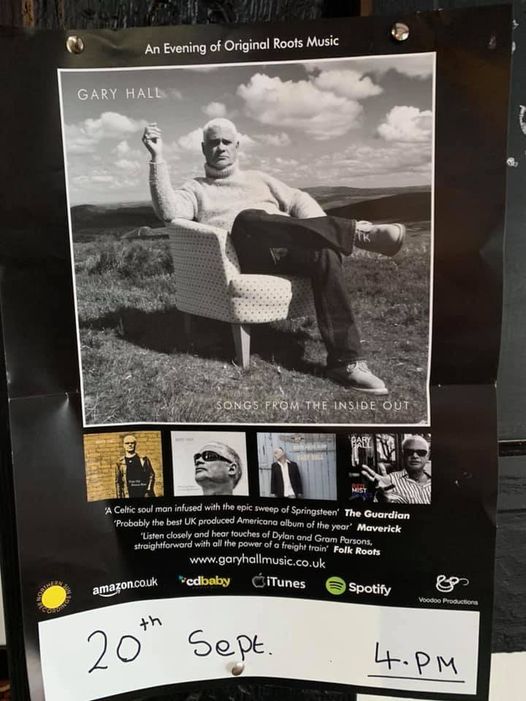
Gary has created his own legacy of a couple or more albums recorded on what was a wonderfully independent record label, Roundtower, and has a legacy of scores of great songs of observant and honest lyrics set to rock music of great integrity. Songs from that part of his career sit among Stormkeeper songs on my playlist. I particularly love She´s Always Been A Hotel, a song for his mother, whom I met on occasions. Our first meeting was when she burst into Gary´s studio, an adjoining room to his mum´s large house, to tell us (her then twenty seven year old son and a nearly forty year old ´jouurnalist´) to ´turn that music down !´
A few years later he sent me a copy a book about The Beatles, putting into printed word discussions he had in my house with my young son Andrew, advising my boy to disregard the band, as they really weren´t that important, and to go in search of his own music. My son, who worshipped him, listened and did so.
Gary has also proved himself an excellent record producer, and has nurtured some raw talents and made them fit for purpose and able to find their way in the industry.
He has recorded a number of his own critically acclaimed albums, too, but mass public approval, which he has never sought, refuses to come to him. Maverick talent scares the hell out us doesn´t it?
He perhaps looks, on the cover for his latest album, Songs From the Inside Out. somewhat comfortingly, more like Val Doonican in a woolly jumper and armchair than he used to. That same photograph used on our cover for this post, was also used on gary´s facebook promo flier for a gig he recently delivered, for the first time in the last covid-riddled six months. It is great to hear he is still playing live gigs. He seemed to bestride a stage like a colossus back in the day, and with what seems on that poster to be the Pennine Moors as his theatre, his voice, whether in rage or compassion (for he is eloquent and powerful in either) will have boomed across the landscape for miles.
I´m a huge fan of Gary Hall but you can find out for yourselves just why that is by visiting http://www.garyhallmusic.co.uk/

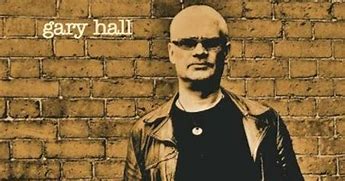


Leave a Reply
Want to join the discussion?Feel free to contribute!